
There has been considerable discussion recently on the wonderful views from the Howick Stockade but its history is also important.
There is no evidence that Maori ever lived on or used Stockade Hill as a lookout. Maori have lived in this area for more than 1000 years with several pa [fortified villages] including Paparoa Pa at Waipaparoa-Howick Beach [in today’s Marine Reserve] which was destroyed in about 1650.
Murvale Reserve, in Bleakhouse Road, was strategically occupied due to extensive views over the Tamaki River route to the Manukau Harbour.
As Howick was a military settlement, the highest point was designated a “military reserve” with views over the imagined “long river” hence Owairoa, the Maori name for Howick.
Until June 1863, Stockade Hill was a bare, treeless windswept grass-covered knoll. But when there was a false rumour of a threatened attack on the settlers of Auckland by Kingites of Waikato, Governor Sir George Grey ordered Waikato be invaded.
The Howick yeomanry Cavalry Corps was established. All men 16 to 40 were conscripted. Six former Fencibles, recognising that most were too old to fight, and 41 sons of Fencible-settlers and 32 farmers and farm labourers served from Howick in this civil war in the Waikato.
Howick residents knew how to cut and use earth sods for boundary fences and buildings. Colonel SP Peacocke, who lived in Hawthornden in Cook Street, ordered residents to build a one metre deep ditch with near vertical sod walls surmounted with vertical thick corrugated iron sheets. William White and Dan Strong, Howick carpenters, built the Howick Blockhouse for 20 pounds. It was about thirty feet long with two inch timber walls and iron roof.
Local Maori Ngai Tai leaders Hori Te Whetuki and Hone Te Irirangi, son of Tara Te Irirangi, expressed their loyalty to the Crown by wearing British Army uniforms and flying the Union Jack at their Wairoa River villages.
Hori Te Whetuki – called “Long George” by his pakeha friends – used to buy goods from Hattaway’s General Store in Wellington Street. Mrs Maria Hattaway used to reward him with a pannikin of tea and fresh buns. Ngai Tai had no intention of attacking the settlers of Howick district.
Settlers from Pakuranga, East Tamaki, Whitford, Maraetai and Flat Bush, especially women, children and a few men, slept in the stockade for about three months for safety. Some returned home to feed farm animals during the day. The local militia, British Army 70th Regiment and Bavarian mercenaries from Puhoi, camped at the stockade. At one time there were two hundred troops here.
On Christmas Eve in 1863 the Bavarians gave out presents to all the children and sang carols around a decorated Christmas tree. Soon afterwards peace was declared and they returned to their allotments. The Stockade Hill Reserve was leased to farmers and the stockade water troughs, corrugated iron and coal scuttles are now at the Howick Historical Village.
The War Memorial gives the hill sacred significance. Suggestions for a revolving restaurant, a market, children’s playground and council chambers have all been rejected in favour of a grass-covered knoll retaining our wonderful views.
- Alan La Roche, Howick Historian








